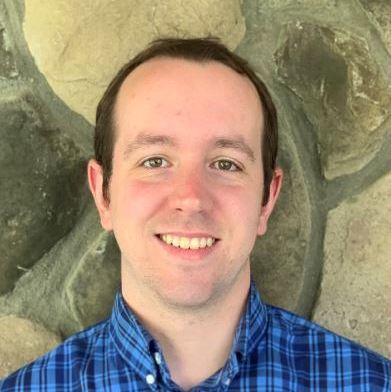
Daniel Gingerich joined the laboratory of Ornit Chiba-Falek, PhD, last year, exactly two days before the COVID-19 pandemic forced a campus-wide shut down, forcing him to learn a new set of technical skills from home. Since then Gingerich has become proficient in single-cell data analysis, and is using those techniques to better understand genetic and epigenetic dysregulation in late onset Alzheimer's disease. In this week’s Spotlight interview, Gingerich talks to us about this work, his plans for a future in bioinformatics and biostatistics, and enjoying listening to and playing his own music when he’s not at Duke.
What are your current responsibilities within the Chiba-Falek lab? What does a typical day for you look like?
I am a lab technician working under Dr. Julia Gamache and Julio Barrera on the single cell genomics and epigenomics project. My experience at the Chiba-Falek lab has been quite unique and unexpected. Once I was hired, I was only able to receive training at the bench for two days before the lab was shut down due to the pandemic. In the meantime, I stayed in touch with Julia, who introduced me to the data analytics side of the project. I acquired skills in single cell data analysis and became proficient in the R coding language while working from home. Eventually, I had developed my skillset enough that I was given the responsibility of performing the analysis of our single nuclei ATAC-seq data. The experience has ignited a newfound passion in me for bioinformatics and statistics.
During the typical day at work, I spend most of my time performing computationally intensive tasks on large scale data. Because the field of single cell sequencing is relatively new, this work requires me to stay in touch with our collaborators and the online community, as well as staying up to date on the current literature. Currently, I am working on finishing the single nuclei ATAC analysis for our first work on single cell data. Now that I am trained at the bench, I also help with nuclei isolation and library preparation for our future projects in the single cell field.
What projects are you currently working on, and how will they help us better understand, prevent, or treat neurodegenerative conditions?
In my current project, I work with Julia and Julio, investigating genetic and epigenetic dysregulation in late onset Alzheimer's disease. We use NGS technology from 10X Genomics and Illumina that unveils the individual transcriptomes and chromatin accessibility profiles of thousands of cells obtained from a small tissue sample. My primary role in the project is the analysis of data acquired from the single-nucleus assay for transposase accessible chromatin using sequencing (snATAC-seq).
This method identifies accessible regions of DNA within chromatin at single-cell resolution. Thousands of cells from a region of the brain each have their own unique chromatin accessibility profile, which gives insight to gene expression, enhancer-promoter interactions, and other regulatory mechanisms.
Single-cell resolution enables the identification of cell type subpopulations exhibiting altered disease states that would otherwise be masked by bulk sequencing. Given the complexity of uncovering the consequences of different epigenetic and genetic states with regards to neurodegeneration, this project is a small piece to the puzzle. We plan to use our data to better understand the gene regulatory landscape of neurodegenerative conditions to identify future targets for therapeutic methods.
What plans do you have for the future? If you could have any job in the world, what would it be?
Within the next two years, I plan to apply to several different bioinformatics and biostatistics PhD programs. I majored in biology and chemistry, so I must complete a few mathematics prerequisites before applying. I am open to working in either academia or industry. Ideally, I want to combine in-depth knowledge of biology, statistics, and programming to develop new algorithms and data analysis pipelines to help progress future research.
To answer the second question - if I could have any job in the world, I would produce music. I have been passionate about music for a very long time.
What do you enjoy most about your work?
I am extremely grateful for my job at the Chiba-Falek lab. This job has introduced me to several useful skills in biology, statistics, and computer science. I especially enjoy the use of creativity in programming to solve complex biological problems. I find working with numbers and large-scale data very compelling, and I seek to dive deeper into biostatistics.
This would not be possible without the team of people I get to work with. I am humbled by the level of scientific knowledge each person brings to the table. My immediate lab members and our collaborators have fostered a work environment in which everyone is able to learn and grow.
What’s the hardest part of your job?
Single cell technologies enable the acquisition of high throughput data at an unprecedented level of detail. This presents many different problems, primarily the lack of standardized methods for obtaining and analyzing single cell data. As challenging as this can be, I enjoy this part of my job because it allows me to be creative, think critically, and fosters a collaborative work environment in which everyone is given a chance to offer ideas. I especially love learning about new algorithms for analyzing single cell data.
What other passions or hobbies do you have outside of the Department?
I have a strong passion for music. Outside of work I like to play guitar and produce music on my computer. I love music theory especially pertaining to jazz. Like science, I find that there are always new concepts to learn and more questions to be asked. Another hobby of mine is running. It is a great stress relief and mental aid. I enjoy playing disc golf with my friends on the weekend, and I also love scary movies and TV shows.
